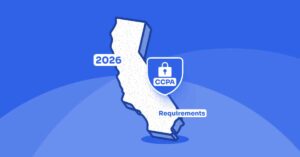Introduction
The Vermont Data Privacy Act (VDPA) is a comprehensive state privacy law aimed at enhancing the protection of personal data for individuals residing in Vermont. This data privacy bill, passed by the Vermont legislature on May 11, 2024, is set to bring about substantial changes in the way personal data is gathered, utilized, and safeguarded by businesses that operate within the state. The VDPA is scheduled to come into effect on July 1, 2025, and encompasses a range of provisions specifically crafted to address consumer rights, reinforce data security measures, and outline the obligations of companies concerning the handling of sensitive data.
Definition and scope of personal data
Personal data under the VDPA (Very Detailed Personal Data Act) refers to any information that can be utilized to distinguish or trace back to a specific individual. This encompasses a wide range of data, including but not limited to names, addresses, financial account details, biometric or genetic data, and other identifiers such as IP addresses. The Act also pertains to sensitive data, which involves more rigorous protections for information revealing racial or ethnic origin, religious or philosophical beliefs, and union membership.
Applicability thresholds for businesses
The Vermont Data Privacy Act (VDPA) applies to businesses that collect personal data from at least 25,000 Vermont residents on an annual basis or derive more than 50% of their gross revenue from the sale of personal data. This threshold has been set to ensure that large data holders and data brokers are held accountable for their data processing activities. The legislation emphasizes the significance of safeguarding consumer health data and other sensitive information, aiming to uphold the privacy and security of individual’s personal information.
Consumer rights under the VDPA
Residents of Vermont have a number of rights when it comes to their personal data. These rights encompass the ability to access their information, correct any inaccuracies, delete data that is no longer necessary, and transfer their data to another service provider. In addition, consumers have the right to object to the processing of their data for purposes such as targeted advertising. It is mandatory for businesses to put in place clear and easily accessible methods that enable consumers to exercise these rights.

Data Protection Impact Assessments
Businesses covered by the VDPA are obligated to carry out thorough Data Protection Impact Assessments (DPIAs). These assessments comprehensively analyze and address the potential risks linked to processing personal data, evaluating potential risks and implementing appropriate safeguards. The primary focus is on safeguarding the privacy and security of personal data, with particular emphasis on processing sensitive information and conducting extensive data collection on a large scale.
Specific security measures for sensitive data
The Vermont Data Privacy Act requires businesses to put in place specific technical and organizational measures to safeguard sensitive data. These measures should ensure an appropriate level of security in line with potential risks, incorporating practices such as pseudonymization and encryption of personal data. Additionally, companies are obligated to regularly assess and test their security measures and have the capability to promptly restore access to personal data in the event of a physical or technical incident.
Age-Appropriate Design Code
The Age-Appropriate Design Code is designed to safeguard the privacy and security of individuals under the age of 18 when they use online services. Businesses are required to prioritize the best interests of children in the design of their online platforms. This involves taking measures to limit the collection of data from children, offering clear and easily understandable privacy notices, acquiring verifiable consent from parents for processing children’s data, and incorporating strong mechanisms to verify the age of users.
Disclosure requirements for data brokers
Data brokers must register annually with the Vermont Attorney General’s office and provide information about their data collection practices. This includes disclosing the nature of their business, the types of data collected, the sources of the data, and the purposes for which the data is used. They must also establish and maintain reasonable security procedures and practices to protect the collected data from unauthorized access, acquisition, or use.

Restrictions on selling personal data
The Vermont Data Privacy Act (VDPA) sets forth comprehensive regulations governing the sale of personal data. According to the VDPA, businesses are obligated to obtain the explicit consent of consumers prior to selling their personal data. Additionally, consumers are granted the right to opt-out of the sale of their data at any time. These provisions are designed to address concerns surrounding the unauthorized sale and improper utilization of personal data, with the overarching goal of empowering consumers to maintain authority over their information.
Processing sensitive data
The Vermont Data Privacy Act mandates stringent protections for processing sensitive data, including biometric or genetic information. Businesses are required to obtain explicit consent from consumers before processing this type of data and to implement comprehensive security measures to effectively safeguard against unauthorized access and breaches. These security measures may include encryption, access controls, and regular security audits to ensure compliance and protection of sensitive personal data.
Requirements for data brokers
The Vermont Data Privacy Act (VDPA) imposes specific obligations on data brokers, which are businesses that gather and trade personal data without direct consumer interaction. According to the VDPA, data brokers are required to register with the Vermont Attorney General and provide detailed disclosures regarding their data collection procedures. These transparency measures are designed to ensure that data brokers can be held responsible for how they handle data and to improve consumer confidence in the data industry.
Private right of action
The Vermont Data Privacy Act (VDPA) provides consumers with a limited private right of action, a legal provision that allows individuals to file lawsuits to seek damages in the event of specific violations related to data privacy. This right is set to be available from 2027 through 2029, and its presence is intended to serve as a strong deterrent against non-compliance with the privacy regulations outlined in the VDPA. The inclusion of the private right of action, which empowers consumers to take legal action, highlights the significant emphasis placed on data protection and underscores the importance for businesses to ensure strict adherence to the law.
Data protection assessments
It is important for companies to conduct regular data protection assessments in order to comply with the regulations of the VDPA. These assessments play a critical role in evaluating the efficiency of data protection measures and identifying any areas that may require improvement. By conducting these assessments on a regular basis, companies can maintain high levels of data security and uphold consumer rights.

Enforcement measures
The Vermont Attorney General plays a crucial role in enforcing the Vermont Data Privacy Act (VDPA), which sets forth comprehensive regulations for businesses operating in the state. This legislation imposes stringent obligations on businesses regarding the collection, use, and protection of personal data, and violations may result in substantial fines and penalties. Moreover, the Attorney General’s office is dedicated to providing guidance and support to businesses to help them comply with the demanding standards established by the new regulatory framework.
Handling consumer requests
Businesses are required to establish clear and transparent protocols to handle consumer inquiries related to their personal data. These inquiries may involve requests to access, correct, delete, or transfer data. It is essential for companies to promptly acknowledge and respond to these requests within a specified timeframe. Additionally, they must ensure that these procedures are easily comprehensible and easily accessible to consumers.
Addressing dark patterns
The VDPA takes a strong stance against the use of dark patterns, which refer to deceptive design techniques aimed at influencing consumer behavior. These manipulative practices are explicitly prohibited by the VDPA, specifically in scenarios where they are used to coerce consumer consent or deceive individuals into sharing more personal data than they originally intended. This provision is crucial in upholding transparency and ethical practices in the collection and processing of consumer data.
Impact on online services
The Vermont Data Privacy Act (VDPA) has far-reaching effects on personal data companies and online services that collect and manage the personal data of Vermont residents. These services are now obligated to comply with the stringent data protection requirements. This entails obtaining explicit consent from consumers before collecting their personal information, providing clear and comprehensive notifications about data collection practices, and implementing robust security measures to protect the privacy and security of personal data.
Conclusion
The Vermont Data Privacy Act is a groundbreaking piece of legislation that is designed to greatly enhance data privacy and protection for residents of Vermont. The Act introduces a robust set of privacy laws and regulations aimed at ensuring that businesses are held accountable for their data-handling practices. Its primary goal is to provide a safeguard for personal data and to bolster consumer confidence in the digital landscape. Companies that are operating within Vermont’s jurisdiction are required to proactively prepare for the enforcement of the VDPA. This involves conducting thorough reviews of their data processing activities, regularly assessing their privacy measures, and taking all necessary steps to ensure full compliance with the new laws. It is crucial to establish a contractual relationship with processors and third parties who have access to the personal data collected, outlining the rights and obligations of all involved parties.




